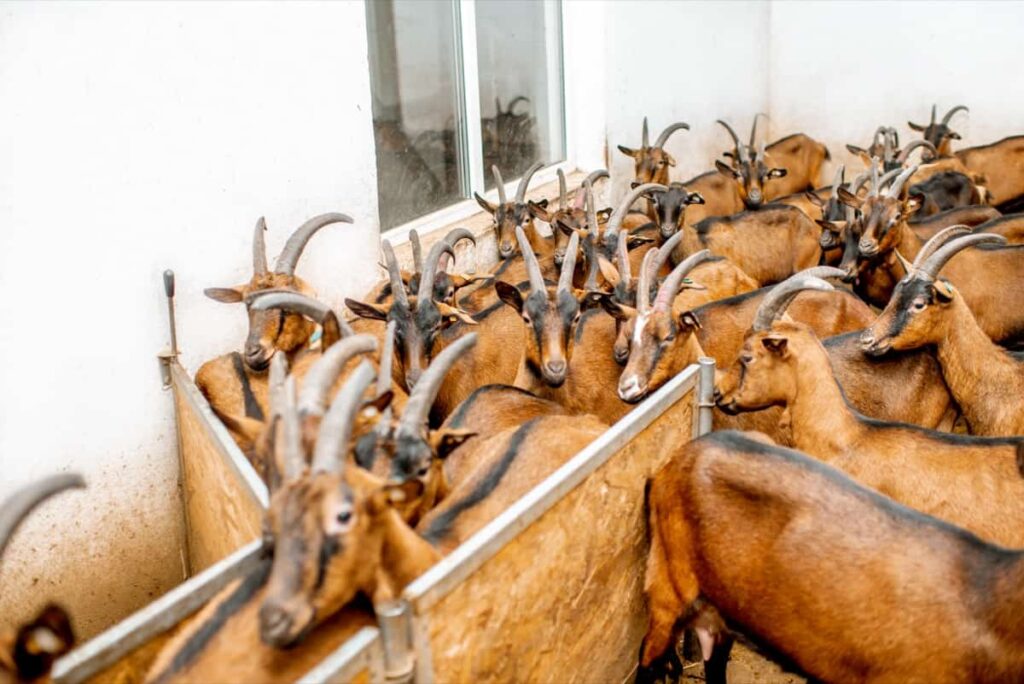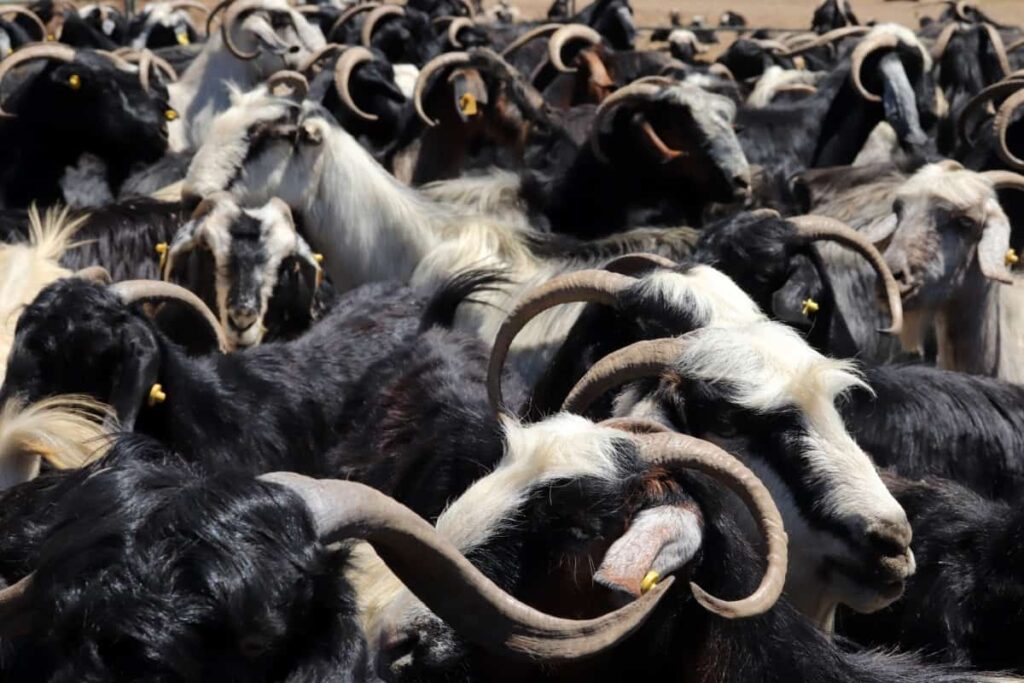Goat farming refers to the practice of raising goats for various purposes, including milk, meat, fiber, and even as pets. It is one of the oldest forms of agriculture in human history. Let’s check out a few goat farming profit tips below.

Tips to Start a Profitable Goat Farming Business
- Start Small: If you’re starting with goat farming, beginning with a small herd of goats is important until you gain more experience.
- Know Your Goats: It’s important to know what kind of goats you want and their characteristics before purchasing them.
- Provide Proper Shelter: Providing your goats with proper shelter is crucial for their health and well-being.
- Fence Appropriately: Fencing is an important aspect of goat farming as it helps keep predators away from the animals.
- Keep Your Goats Healthy: Regular veterinary check-ups and vaccinations are essential in keeping your herd healthy.
- Give Them Enough Space: Make sure each goat has enough space to move around freely so they don’t feel cramped or overcrowded.
- Feed Them Well: Feeding your goats properly will help them grow strong and healthy, so make sure they have access to clean water at all times as well as good quality food.
Tips to Maximize Profits in Goat Feeding Management
- Goats can survive in harsh environments. Their unique digestive system allows them to eat various plants and grasses that other animals cannot digest. However, goats require a balanced diet to maintain good health and productivity on the farm.
- The primary feed for goats is roughage, such as hay or pasture grasses. Alfalfa, clover, and Bermuda grass are popular for goat farmers because they provide essential nutrients like protein, fiber, and minerals. Ensuring the hay is clean and free from mold or dust is important.
- In addition to roughage, goats also need access to fresh water. Treats like fruits or vegetables should only be given in moderation as they do not provide the nutrition that goats need. Overfeeding treats may cause an imbalance in their diet, leading to health issues. Providing your goats with high-quality roughage and supplements will keep them healthy and productive on your farm.
Health Care Tips to Get More Profit in Goat Farming
- Taking care of your goats’ health is crucial for the success of your goat farming business. One important aspect of goat health care is vaccination. Vaccines protect goats from various diseases and infections, such as tetanus, enterotoxemia, and pneumonia.
- Another essential part of goat health care is deworming. If left untreated, goats are prone to internal parasites that can cause weight loss and death. Regularly deworming your goats with the appropriate medication can prevent these problems.
- Hoof trimming is also an important part of goat health care. Overgrown hooves can lead to discomfort and lameness for the animal. Trimming their hooves regularly will help prevent this issue.
- In addition to physical check-ups by a veterinarian at least once a year, it’s important to observe your goats’ behavior and daily routine for any signs of illness or injury. Early detection can help prevent serious illnesses from developing further.
- Proper healthcare practices are key to maintaining healthy and productive goats on your farm.
Tips on Making a Profit with Your Goat Farm
- Starting a goat farm requires some investment to get started. However, the cost may change depending on several factors, such as location, breed selection, and feeding requirements. Spending wisely while setting up your farm is essential for this venture’s profitability.
- One of the first things you need to consider when starting a goat farm is purchasing land for grazing or building pens if you don’t have enough space for grazing. The land needed largely depends on how many goats you plan to keep and their breeds.
- Another significant expense when starting a goat farming business is buying goats themselves. Feeding costs are another crucial factor determining goat farming profitability because they account for over 70% of total expenses. If no natural pasture is available, you’ll need hay/grass pastures or silage/hay bales. Use automated feeding systems or invest in high-quality equipment to save time and money.
- It would help if you also considered investing in proper fencing materials like electric wire fences since predators like coyotes or dogs might attack your herd at night.
In case you missed it: A Guide to Small-Scale Rural Goat Farming: Tips, Tricks, and Best Practices

Factors Affecting Profit in Goat Farming
- One crucial aspect of goat farming is choosing the right breed for your needs. Whether you aim for dairy or meat production, there are various breeds to choose from with their unique characteristics.
- Another essential factor in profitable goat farming is ensuring proper nutrition and health care. This entails providing adequate feed that meets nutritional requirements while minimizing costs. Additionally, regularly monitoring goats’ health status helps prevent diseases and infections that can lead to significant losses.
- Choosing high-yielding goat breeds is crucial in maximizing profit potential. It’s important to research which will work best for your specific goals before investing.
- Feeding costs can also impact profitability. While goats can eat various foods such as hay, grains, and vegetables, it’s important to consider the cost of these items when budgeting. Many farmers grow their feed or buy in bulk to save on costs.
Choosing the Right Goat Breeds for Maximum Profit
- Choosing the right goat breed is crucial for maximizing profits. Different breeds have different qualities and produce milk, meat, or fiber products. Researching well and choosing a breed that suits your goals is important.
- If you’re looking for a dairy goat breed, consider Saanen or Nubian goats, known for producing large amounts of milk. If you plan on selling their offspring for meat production, Boer goats are the most popular choice due to their fast growth rates and high-quality meat.
- Angora goats provide mohair fiber for farmers interested in wool production, which can be sold at premium prices. On the other hand, Cashmere goats produce fine hair in luxury clothing items like scarves and sweaters.
- Selecting the right breed is an important aspect of profitable goat farming. Consider your specific goals while researching before bringing new animals into your herd.
Common Mistakes to Avoid in Goat Farming for Getting More Profit
- When starting a goat farming business, there are important things to consider to avoid common mistakes that may lead to losses. One of the most common mistakes is inadequate knowledge and lack of experience in animal husbandry practices. This can cause poor management, leading to diseases and low productivity.
- Another mistake is not considering the breed selection based on the environment and market demand. Choosing the wrong breed may result in lower meat or milk production while selecting an expensive breed without market demand will also lead to financial loss.
- Underestimating feeding requirements and cost considerations are other mistakes beginners make in goat farming. Feeding goats low-quality food leads to a slow growth rate, poor health, and low reproductive performance.
- Ignoring health care measures such as vaccinations against diseases like pneumonia or foot rot can lead to serious illnesses that could wipe out your entire herd.
In case you missed it: Best Practices for Disease Prevention and Management in Goats: Strategies for Maintaining a Healthy Herd

Conclusion
Goat farming can be profitable for beginners with the right knowledge and resources. Factors contributing to profitability include choosing the right breeds, proper feeding and care, and avoiding common mistakes.
- Goat Milking Practices and Equipment: A Beginner’s Guide
- Goat Farming for Fiber: Producing Mohair and Cashmere
- Maximizing Goat Milk Production: Tips for Dairy Goat Farmers
- Goat Farming as a Family Business: Strategies for Success
- Profitable Kenya Goat Breeds for Commercial Dairy and Meat Business
- Unlock the Secrets of Oberhasli Goat: Discover Raising and Management Practices
- Ultimate Guide to Myotonic Goats: Explore Profile to Raising
- Unlock the Secrets of Rove Goat: Discover Management Practices
- Ultimate Guide to Malwa Goat: Explore from Origin to Management Practices